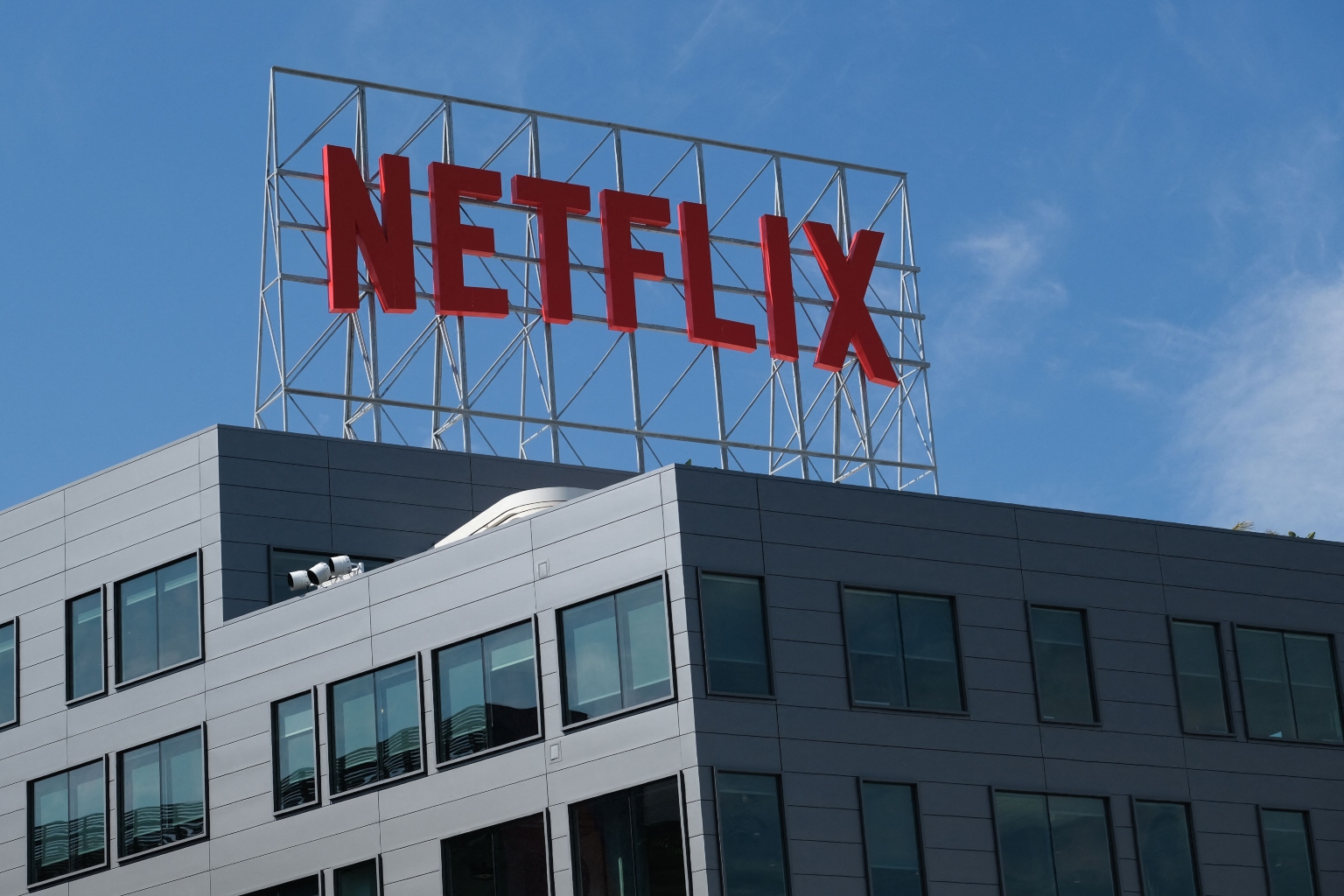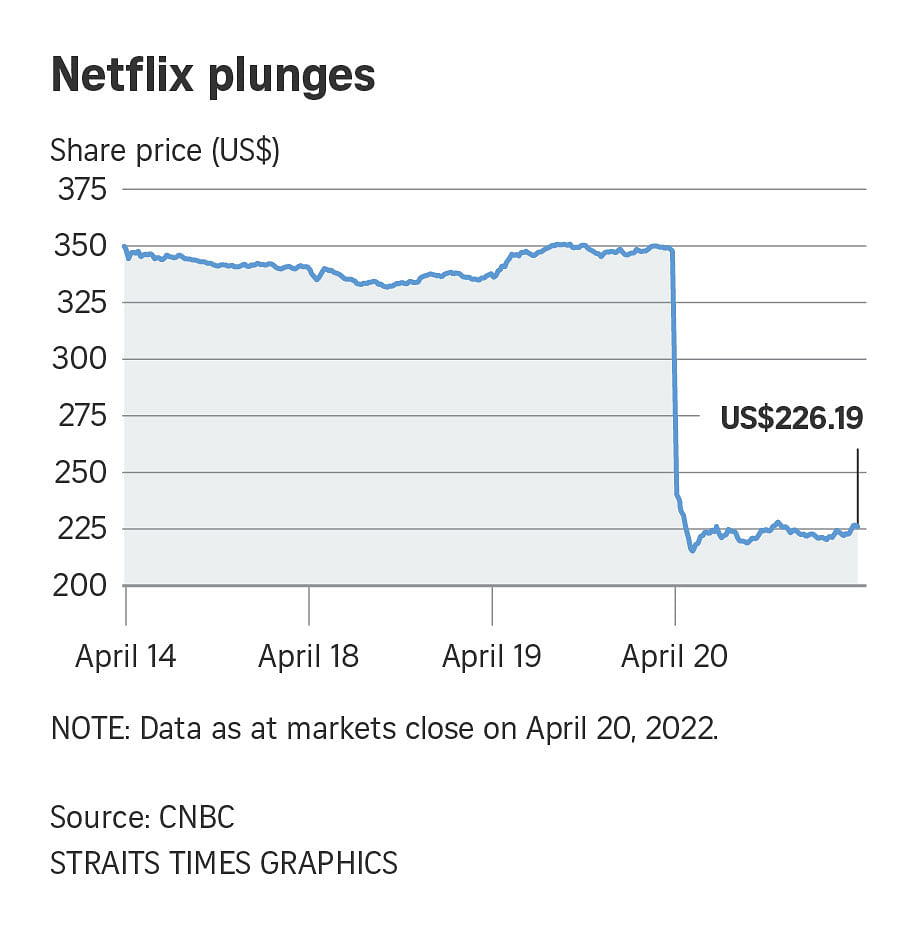Netflix subscriber woes hint at consumer pushback on prices
Sign up now: Get ST's newsletters delivered to your inbox

For Netflix, there are a few other factors at play such as competition from other streaming services.
PHOTO: AFP
NEW YORK (BLOOMBERG, REUTERS) - Love may be blind, but consumers are not - at least, when it comes to higher prices.
A couple of dollars more a month normally is not enough to move the needle, but when Americans are facing the fastest inflation in 40 years, something has got to give. And for 600,000 people in the United States and Canada, that something was their subscription to Netflix.
Consumer spending is by far the biggest contributor to the US economy, and economists are keenly looking for any signs that higher prices are starting to chip away at demand. The latest quarterly results from Netflix, which counts TV shows like Love Is Blind and Bridgerton among its biggest hits, may provide some evidence that it is already in motion.
"It's a very early signal," said Mr Neil Saunders, managing director at GlobalData. "One of the things people will most certainly look to cut as inflation bites are those recurring payments month in and month out, and that obviously includes streaming."
Earnings season is just getting under way, and there are other pockets of the economy where consumers are pushing back on higher prices. Retailers like Bed Bath & Beyond blamed slowing sales in part on inflation that is hurting consumer confidence, and grocery chain Albertsons is bracing for less spending by lower-income customers as food bills surge.
For Netflix, there are a few other factors at play. Competition from other streaming services like Hulu and Disney+ is heating up, and as the world returns to normal, people are eager to get off the couch and start living again.
How that will play out in other corporate earnings remains to be seen. Economists have been expecting consumers to shift more of their spending dollars from goods, like home furnishings and cars, to services that include travel and dining out as Covid-19 restrictions are lifted. But with inflation taking a bigger bite out of paychecks, there is less real discretionary income for purchases beyond the necessities.
"It is clear that the cost-of-living crisis will be forcing many Americans to reconsider their spending decisions," said Mr Craig Erlam, senior market analyst at Oanda. "While there may still be some excess savings, it is only natural that households are seeing costs rising and considering where they can cut back."
Pricing power
So far, companies have had a fair bit of success passing along higher costs for materials and labour. Supply shortages combined with a snapback in demand have broadly pushed up prices across the economy, while trillions in government financial relief and low borrowing costs have played a role in keeping that demand elevated for longer.
But companies also have to be cognisant of the impact of their price hikes on their sales.
For retailers operating bricks-and-mortar stores, it takes time to raise prices, and they have to be thoughtful about their strategy in doing so, said Ms Kristen Gall, president of Rakuten Rewards, a shopping platform that offers consumers deals and rewards from retailers. That might not play out in the first quarter but come later this year, consumers could especially feel the squeeze, she said.
"I think retailers still do have the power to raise prices and still be okay," Ms Gall said. "The question is, do any of them overshoot and raise prices by too much and it actually turns customers away from their brand."
It is a difficult balance to strike, and while consumers are so far hanging tough in the face of decades-high inflation, they are still sensitive to prices. Data last week from retail sales and consumer sentiment offered some comfort that Americans are not ready to pull back on spending en masse just yet.
But as seen with Netflix's price increase of just a dollar or so, it does not take much to tip someone over the edge.
"It completely changes the landscape as soon as your start touching price," said Ms Liza Amlani, principal and founder of the Retail Strategy Group. "People are not going to pay for something they don't see the value in."
Password sharing
Investors, meanwhile, are sceptical of Netflix's plans to crack down on account sharing.
Its plans to get tough on account sharing failed to reassure Wall Street that the world's largest streaming video company had found a way to spark new growth.
Netflix shares plunged 35 per cent on Wednesday (April 20), shaving more than US$50 billion (S$68 billion) off its market value, a day after it said it would ask subscribers who share their accounts with people outside of their households to pay more. It blamed password sharing, in part, for its failure to hit subscriber growth targets.

The extent of the shared accounts - estimated at 100 million around the world, including 30 million in the US and Canada - was a warning sign of its own.
Media analyst Michael Nathanson wrote that the crackdown on password sharing signals Netflix thinks it is "hitting a wall" at 221.6 million subscribers. "Any company with large out-year subscriber and (revenue) targets should be a bit more nervous today," he wrote.
Netflix chief operating officer Gregory Peters on Tuesday told investors the company would not stop a subscriber sharing with a sister. "But we are going to ask you to pay a bit more to be able to share with her and so that she gets the benefit and the value of the service, but we also get the revenue associated with that viewing."
Netflix has been working on the issue for two years and conducting tests. In March, Netflix began charging users in Chile, Costa Rica and Peru an additional fee to share their accounts with up to two people. On Tuesday, the company said it plans to introduce the new charge for password sharing globally, within a year.
"We don't believe that this strategy will be the panacea that some investors have outlined over the last few years," said Morningstar analyst Neil Macker. "Netflix may be able to squeeze a few more dollars out of some of the primary households, but we think that other ones will look at the new sharing fee as another pricing increase and cancel."
Others simply scoffed at the notion that password sharing accounted for Netflix's loss of 200,000 subscribers in its first quarter and predictions that it would lose even more members in the spring.
"It seems more like an excuse for the poor performance than anything else," said Mr Manuel Muhl, an analyst with DZ Bank. "Password sharing has been a problem for years. This cannot be cited as a valid reason for disappointing user growth."


